Church Member with ALS Finds Joy in Faith, Family, and Serving Her Ancestors
Contributed By Aubrey Eyre, Church News staff writer
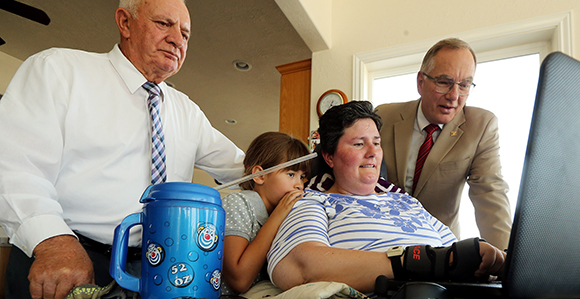
Jody Bashaw, who is battling ALS, does family history indexing in her home. Bashaw shows what she does on her computer on Sunday, August 5, 2018. Jody was taught how to index by her home teacher, Scott Soulier. Photo by Scott G Winterton, Deseret News.
“Because of Jody’s quiet, faithful, one-finger-on-the-keyboard-at-a-time-service, thousands of names have been made searchable.” —Scott Soulier, neighbor
Picture this. While walking home from church on a sunny Sunday afternoon, a large Jazzy wheelchair whizzes past carrying two people giggling and laughing. Moments later, an older man walks quickly by, trying to keep up as the scooter swerves back and forth along the street. The two on the scooter are mother and daughter. The man following behind, their father and grandfather. For all three, it’s one of the best parts of their Sunday.
Eight years ago, Jody Bashaw, of the River Ridge 11th Ward in the South Jordan Utah River Ridge Stake, had two life-changing experiences. First, she gave birth to her youngest daughter, Charlee, and second, she was diagnosed with amyotrophic lateral sclerosis, commonly known as ALS or Lou Gehrig’s disease.
At the time Bashaw first started experiencing symptoms, she was about 30 years old and neither she nor her family had any idea what was happening. Having been in a car wreck not long before the onset of her ALS symptoms, Bashaw and her father, Van Palmer, said they initially thought the symptoms were just delayed effects of the car wreck. “We didn’t have a clue what was going on,” Palmer said.
For Bashaw, a single mother of three, the first sign that something more serious might be going wrong was when she lost the use of her index finger. She explained that suddenly she was unable to straighten or control it. She went to the doctor for multiple tests but received no clear indication of what was wrong. Nearly a year later, she lost control of her other index finger. That’s when the doctors seemed to settle on the conclusion of ALS.
As Bashaw explained it, what happens to one side often happens to the other, like a delayed mirror effect. After nearly three years of being tested, in 2010, the doctors confirmed to Bashaw and her family that she had ALS and that she most likely had a year, maybe two, left to live.
A will and a way
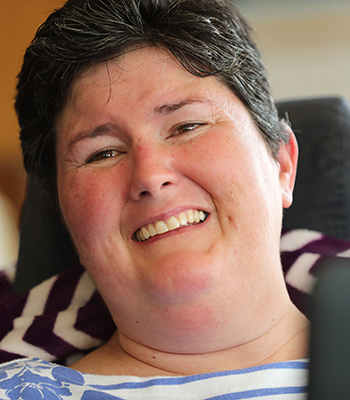
Jody Bashaw, who is battling ALS, talks about her efforts to do family history indexing on Sunday, August 5, 2018. Photo by Scott G Winterton, Deseret News.

Scott Soulier, Jody Bashaw’s former home teacher who helped to teach Jody how to index, holds a certificate of excellence that she received. Jody is battling ALS and continues to do family history indexing. Jody’s dad, Van Palmer, and her daughter Charlee stand at her side on Sunday, August 5, 2018. Photo by Scott G Winterton, Deseret News.
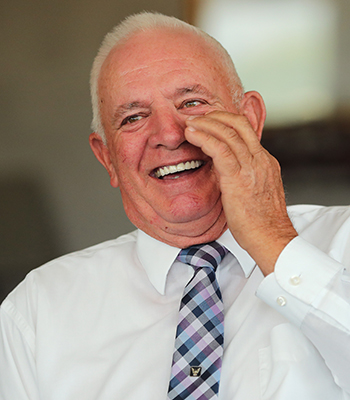
Van Palmer, Jody Bashaw’s father, laughs on Sunday, August 5, 2018, as he recalls a funny experience with Bashaw. Bashaw, who is battling ALS, continues to do family history indexing. Photo by Scott G Winterton, Deseret News.
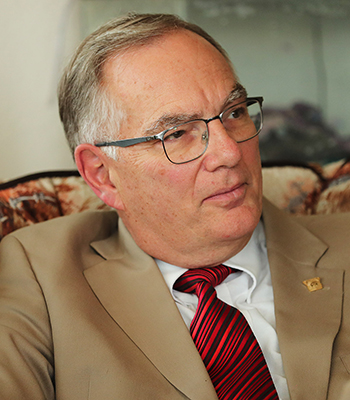
Scott Soulier talks about Jody Bashaw, who is battling ALS and continues to do family history indexing. Bashaw was taught indexing by Soulier.
From the time she was diagnosed, Bashaw said it was a downhill slide. “I was falling down a lot, and I couldn’t eat, and I lost a lot of use of my arms, and I was having trouble swallowing and drinking,” Bashaw explained of the first year of degeneration.
After being diagnosed, Bashaw entered into a study with the University of Utah. When the study started, Bashaw was one of 11 patient participants.
“The other 10 have gone,” Palmer said. “And the doctors ask her, ‘Jody, what are you doing different?’”
Others, including Jody, may have a different answer, Palmer said. But for him, the answer is undeniable. She has been blessed with a combination of things that have helped her keep the will to live, and among those are her faith and her family, Palmer explained.
“Like Charlee, for example,” Palmer said, showing effort to keep his emotions in check. “That little girl, she gives Jody something to live for.”
Palmer said that Jody’s name is nearly always on the prayer roll at the temple as well and that the personal prayers of friends and family have no doubt helped give Jody strength to continue on despite her challenges. But what it really comes down to, in Palmer’s view, is that she simply has the will to keep on living.
After diagnosis, Bashaw was seeing two specialists. “One of them told her she had a year, and the other told her a year and a half,” Palmer said. “She’s at almost 8 and a half [years] now. She’s doing better now than she was then when she first found out she had it.”
A little more than a year following her diagnosis, Bashaw was introduced to a treatment called cold laser therapy. At that time, things were really bad for Jody, Palmer explained. So when he and his wife, Sharon, heard about the new therapy during a Sunday School lesson while visiting Manti, Utah, they decided to see if Bashaw wanted to try it.
“I got movement back in my arms and my fingers,” Bashaw said. “Before I started the cold laser, I couldn’t move my tongue to talk or to swallow, and then a month after, I started moving my tongue.”
Explaining the remarkable difference that cold laser treatments have had on Bashaw, Palmer said, “It’s really helped her. She would choke if you put anything just on the end of a spoon, like the size of a pea and she’d choke. And now, she can’t eat heaping teaspoons, but she can eat whole teaspoons of pretty much anything.”
Twice a week, Bashaw’s son-in-law takes her to Orem where she receives the treatments that have helped restore some of her movement and abilities.
While there still isn’t a cure for ALS, both Bashaw and Palmer said they see cold laser therapy as a miracle from heaven.
“It’s really been a miracle to me, and I really feel that it has improved the quality of my life,” Bashaw said. Smiling, she continued, “That and the care of my family.”
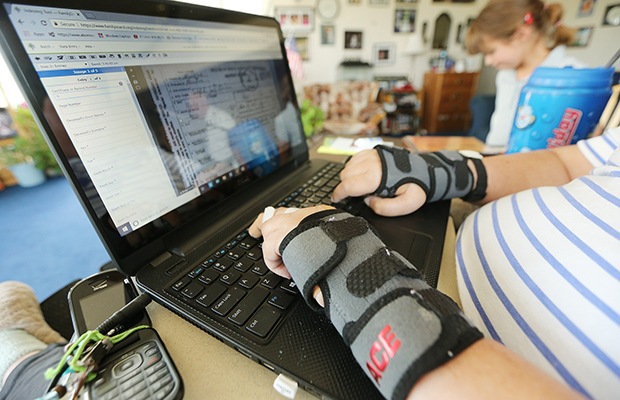
Jody Bashaw, who is battling ALS, demonstrates family history indexing with her daughter Charlee at her side on Sunday, August 5, 2018. Photo by Scott G Winterton, Deseret News.
A different perspective
Even with all the good around them and the many blessings they have received, Plamer admits it hasn’t been an easy road.
“We’d never encountered anything like this, with any of our kids,” Palmer said. “When a doctor tells you you’ve got a year, maybe year and a half, you start kind of looking out of different eyes.”
But despite the struggles and the pain, they still hold on to their sense of humor and their sense of hope.
This winter, Palmer said, he and Bashaw had great fun by following all of the playoff games. Unless a game was a complete blowout, he and Bashaw made sure to watch every game from beginning to end together.
“We had a ball,” Palmer said.
Additionally, a few months ago, during the Jordan River Utah Temple open house, Bashaw had the opportunity to tour through the remodeled temple with her family.
“They were so good to me and they took me on a special elevator so that my wheelchair could fit,” Bashaw said.
Palmer said his favorite part was the way the volunteers decked out Bashaw’s wheelchair for the tour.
“You know how you have to put the little booties on in the temple?” Palmer asked. “Well, they put them on all of Jody’s wheels. She didn’t have to have them on her feet, you know, since they’re there to keep the carpet clean. I thought that was cute,” he said. He chuckled as he thought about it.
Keeping a sense of humor about their situation is one of the best ways to stay positive, Palmer said, admitting he likes to tease Bashaw from time to time.
“Like one time, we had two pieces of cake left, and I said, ‘Hey Jody, raise your hand if you want a piece of cake, otherwise they’re history,’” Palmer said while laughing with his daughter. “That keeps us going, to be able to tease each other. We pull some good ones on her, but she also pulls them right back.”
And despite her situation, Palmer said Bashaw is still the fun mom she’s always been. Reminiscing about the past, Palmer said, “I came home from work one day and Jody and her two older older kids were out here in the yard flipping donuts in their car.” He continued, “Now we have to do it in a wheelchair with Charlee.”
Speaking of the joy that Charlee brings to Bashaw, Palmer explained part of their nightly routine. “We’ll whistle at Charlee at night, when we’re putting Jody to bed,” Palmer said. “Sometimes she’s already down here, but if she’s upstairs we’ll whistle at her, and to see her come down here and cling to her mother and tell her goodnight. … She’s amazing. To see her patience and her love, … and she’s only eight, but it’s as intense as the older kids.”
At just eight years old, Charlee has only ever known her mother with ALS.
“It amazes me her level of understanding,” Palmer said. “If somebody says, ‘What did your mother say?’ she’ll fire right back. She understands and she listens, you know, and I think that’s important.”
“Yep, she’s my translator,” said Bashaw, who slurs her speech as a result of the disease.
Bashaw’s granddaughter, who is three years old, also has a pretty good understanding of her grandmother’s need.
“My son-in-law comes over every night and helps to put me to bed,” Bashaw said, explaining that her granddaughter will often come to help as well. “My granddaughter knows my routine, the order we do everything, and if we forget any one step she says, ‘hey we need to do this.’”
“All of my kids are the light of my life,” Bashaw said. “I thank Heavenly Father every night for my kids and granddaughter. … Everyone that is a part of my circle—I don’t know where I would be without them, and I am so grateful that we are a family forever,” Bashaw said.
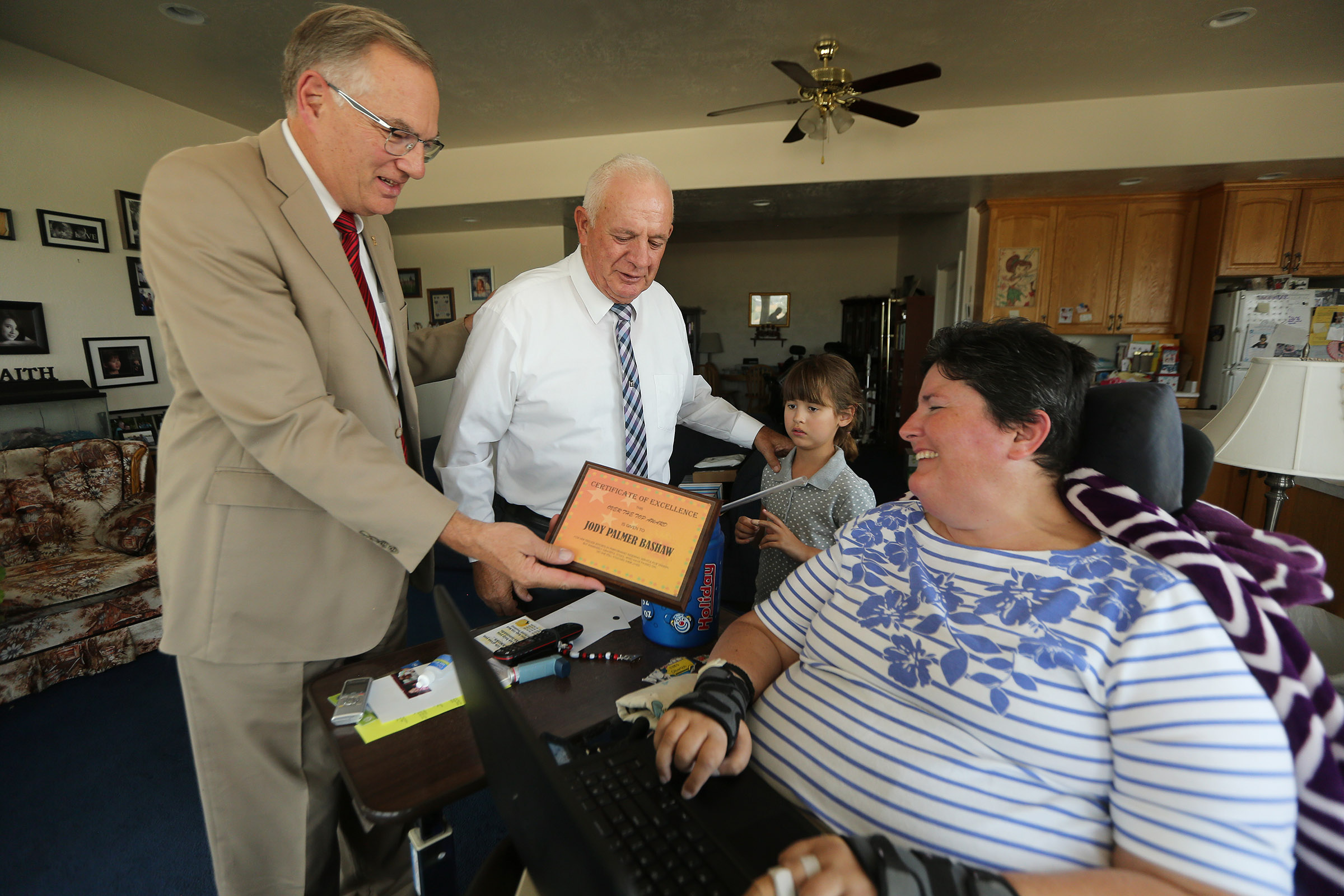
Scott Soulier, Jody Bashaw’s former home teacher who helped to teach Jody how to index, holds a certificate of excellence that she received. Jody is battling ALS and continues to do family history indexing. Jody’s dad, Van Palmer, and her daughter Charlee stand at her side on Sunday, August 5, 2018. Photo by Scott G Winterton, Deseret News.
A small contribution
Last year, Scott Soulier, the Palmer’s neighbor and former home teacher, helped Bashaw find one more thing to add joy to her daily life.
“It came to my attention that she had a new computer and … I had just been called as a family history volunteer at the prison,” Soulier said. “I thought, she’s got a new computer, indexing is easy, maybe she’d like to index. … So I asked her and she lit up like a light. She said, ‘Sure!’”
When he first went to teach her how to index, Soulier admitted he assumed she would just do a couple names and leave it at that. But in the few hours he spent with her, she did 10 records. When she saw him the next Sunday, she reported to him that she had accomplished more than 65. And from that point, Soulier said she just kept going.
Bashaw now leads her ward in indexing numbers, and Soulier recently presented Bashaw with a small award honoring her efforts.
“But the thing that brings tears to my eyes is that the first week, she came to church with band-aids on her fingers.” Soulier said. “She was right down to raw skin and she was bleeding. I would probably quit before that.”
But that is the thing about Bashaw, he said. She doesn’t quit. “She doesn’t have a ton to give, but she gives every ounce that she possibly can,” Soulier said.
Prior to getting sick, Bashaw said she loved to do genealogy work, so when Soulier came around to teach her how to index, she was thrilled.
“Now I type with the two fingers, so it takes me a long time, but it is so worth it,” Bashaw said.
Each time before she starts indexing for a day, Bashaw said she will say a little prayer that the Spirit will help guide her hands and give her the strength to do it.
“Because of Jody’s quiet, faithful, one-finger-on-the-keyboard-at-a-time-service, thousands of names have been made searchable,” Soulier said.
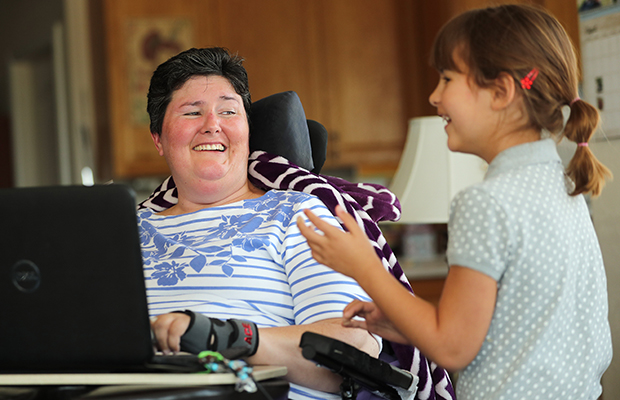
Jody Bashaw smiles as she talks about her family history indexing work. Bashaw, who is battling ALS, talks on Sunday, August 5, 2018, with her daughter Charlee at her side. Photo by Scott G Winterton, Deseret News.
Explaining why she thinks indexing is so important, Bashaw said, “Our ancestors did so much for us, and this is the least that we can do for them. Like my dad said, it all comes back to family. We’re all related somehow on this great earth, so it’s good to think of them and take time for them.”
In addition to indexing, Bashaw said she now also uses the resources of FamilySearch to find family connections to ancestors. Once she gathers the necessary information for her ancestors, she sends their names to her son and daughter-in-law in Iowa so that they can take the names to the temple. And when they come home to visit in the summer or for Christmas, they take her to the temple too.
Because going to the temple is not an easy process for her, Bashaw said she only goes on special occasions, or when her son comes to visit and can help take her.
And the ability to go to the temple is just another thing on the list that helps her stay positive.
“Jody actually does the work, just like you or I or anyone else, but I think that’s really neat that the temple sets things up like that,” Palmer said. “No matter the condition, you can be there and you can do your part.”
Not done yet
Bashaw doesn’t know how long she has. That’s a question that neither she nor the doctors have an answer for, but if it’s up to her, Bashaw said she will keep fighting for as long as she can.
“I’m all emotional,” Bashaw said, trying to find the words to share just how much her family means to her and the role they have played in sustaining her fight.
“I love my family. And I have loved being a mother and a daughter and a sister, and now I’m a grandma. And I don’t want them to be sad,” Bashaw said. “So it keeps me going, because I don’t want to miss anything. When I was diagnosed, everything changed. The doctor said to go home and make yourself right … and then there was the joy when nothing happened. I’m not done. I’m selfish, but I want more time.”
